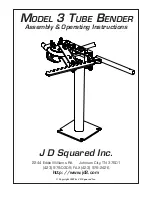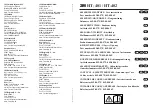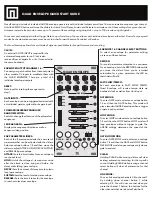
ASTOPAD
®
Instructions for Use
35
9.6 Cleaning and disinfection
ASTOPAD components and accessories are not intended to be in direct contact
with the patient, but they may inadvertently become contaminated with organic
soils (e.g. blood, body fluids) or microorganisms during use.
Therefore after each use the following cleaning and disinfecting procedures shall
be followed.
While cleaning and disinfecting, wear gloves with chemical resistance.
• Always work from top to bottom and from clean to dirty areas.
• After removing blood, discard the wet wipe. Use a new one to continue cleaning.
• Use wipes only as long as they leave a closed liquid film on the surface.
• Use adequate numbers of wipes per surface in order to achieve adequate disin-
fection.
• Dispose of used wipes according the instructions of your facility.
• Follow the specific EPA label disinfectant contact times.
• Work methodically in order to disinfect each area of the device.
Chlorine and peroxides and all other oxidizing disinfectants have a
negative impact on the materials of the applied parts, therefore the use
of such disinfectants for routine disinfection is not recommended. The
lifetime of ASTOPAD components is significantly reduced by these
disinfectants.
9.6.1 Preparation
For an intermediate disinfection use an EPA-registered disinfectant that is labeled
as tuberculocidal.
Recommended Product:
Sani-Cloth® GERMICIDAL DISPOSABLE WIPES from Professional Dispos-
ables International, Inc.
1
The surfaces should remain wet with the disinfectant for the tuberculocidal con-
tact time specified in the wipe manufacturer’s label instructions.
9.6.2 Applied parts
1. Disconnect applied part from the control unit.
2. Close the connector using the end cap (refer to Fig. 2 ASTOPAD COV ap-
plied parts) to protect electrical contacts from entering liquids.
3. Visually inspect all surfaces (all sides) including the junction block and the
connecting cable for wear and tear, cuts, holes and cracks and other unac-
ceptable deteriorations.
Cleaning and disinfecting is possible only when no damage exists! Dam-
aged components should not be used.
4. Visually inspect all surfaces (all sides) including the junction block and the
connecting cable for residues of body fluids and other soilings.
1
EPA registration number: 9480-4
















































